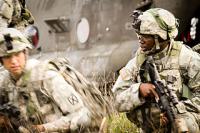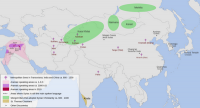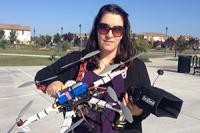-
Experts are often fallible, so expert advice should be examined carefully
Evidence shows that experts are frequently fallible, say leading risk researchers, and policy makers should not act on expert advice without using rigorous methods that balance subjective distortions inherent in expert estimates. Many governments aspire to evidence-based policy, but the researchers say the evidence on experts themselves actually shows that they are highly susceptible to “subjective influences” — from individual values and mood, to whether they stand to gain or lose from a decision — and, while highly credible, experts often vastly overestimate their objectivity and the reliability of peers.
-
-
U.S. to keep 5,500 troops in Afghanistan beyond January 2017

The United States will keep U.S. troops in Afghanistan beyond next year in response to Taliban advances. President Barack Obama was elected in 2008 promising to end U.S. ground involvement in Afghanistan before leaving office in January 2017, but he now admits that that promise cannot be kept. Obama will later today announce that 5,500 troops will remain in Afghanistan beyond January 2017. The present contingent of 9,800 U.S. troops would remain throughout most of next year, being reduced to 5,500 in 2017.
-
-
Pentagon inspects two Colorado prisons for Guantánamo detainees

A U.S. Defense Department team is spending three days this week in Colorado to determine whether two prisons in the state would be suitable for holding dozens of Guantánamo detainees indefinitely. The latest effort by President Barack Obama to close Guantánamo Bay involves inspecting a federal Supermax in Florence and a state penitentiary at Canon City to determine the feasibility of using them to continue the detention of men, currently at Guantánamo, who would not be charged or released by the United States. Colorado lawmakers oppose the move, and critics of the administration say the problem with Guantánamo is not its location, but the practice of indefinite detention without charge far from any active battlefield and the use of military tribunals – and these will not change in a U.S. domestic facility.
-
-
Turkey warns U.S., Russia against supporting Syrian Kurds
Turkish prime minister Ahmet Davutoğlu, referring the Syrian Kurdish forces, earlier today said that Turkey cannot accept “cooperation with terrorist organizations,” as Turkey summoned the U.S. and Russian ambassadors to Turkey to express Turkish displeasure with the United States and Russia supporting Kurdish groups fighting ISIS. Davutoğlu, has warned the United States and Russia against “unacceptable” military and political support for Syrian Kurdish forces fighting Islamic State in Syria. Turkey’s military actions in Syria are a mirror image of Russia’s military actions there. Russia says it is “fighting terrorism” in Syria, but more than 90 percent of its bombing attacks have targeted moderate, non-ISIS Syrian rebels, some of them backed by the United States. Turkey is also waging a “war on terror” in Syria, but the overwhelming majority of its airstrikes have targeted targets in the Kurdish region of Syria, not ISIS targets.
-
-
Christianity looks set to disappear from parts of the Middle East: Report

Christianity looks set to disappear from key parts of the Middle East, according to a report issued Tuesday, 13 October, which highlights a worsening cycle of persecution. Persecuted and Forgotten? A Report on Christians oppressed for their Faith 2013-15, compiled by Catholic charity Aid to the Church in Need, concludes that if the exodus of Christians from Iraq continues at existing levels, the Christians could all but disappear within five years, and that a faster rate of attrition is noted in Syria whose Christians have reportedly plummeted from 1.25 million in 2011 to as few as 500,000 today.
-
-
New strategy: U.S. airdrops arms, ammunition to Syrian rebel groups
In a demonstration of the U.S. strategy shift in Syria, the U.S. military on Sunday it carried out an arms and ammunition airdrop for Syrian rebel groups fighting Islamic State. Last week Washington announced the end of a $500 million program to train and equip vetted rebel groups. The U.S. military refused to provide any details about the groups that received the supplies, their location, or the type of equipment in the airdrop.
-
-
On symptoms and underlying conditions
In the last few days, Israelis in Jerusalem, Tel Aviv, and other cities have been facing a spontaneous, from-the-bottom-up campaign of violence by (mostly) Palestinian youth wielding, in most cases, no more than kitchen knives. This wave of attacks may soon recede, but another eruption of violence will surely come soon unless the underlying conditions are dealt with. The lone-wolf attacks are an immediate security problem with which Israel’s security services must deal. This security problem, however, is only the symptom of a deeper, more pernicious condition. As is the case with a medical condition, dealing with the symptoms would just not be sufficient.
-
-
How Syria is becoming a test bed for high-tech weapons of electronic warfare

Russia’s military presence in Syria has been steadily increasing over the past few months. The latest reports are that Russia has also deployed its most modern electronic warfare system to Syria — the Krasukha-4 (or Belladonna) mobile electronic warfare (EW) unit. The Krasukha-4 is a broad-band multifunctional jamming system designed to neutralize Low-Earth Orbit (LEO) spy satellites such as the U.S. Lacrosse/Onyx series, airborne surveillance radars and radar-guided ordinance at ranges between 150km to 300km. U.S. and NATO intelligence gatherers will have “electronic counter countermeasures” (ECCM) to combat Russian EW interference — and so the cat and mouse game of the cold war is repeated. Intelligence gathering and radar-guided munitions will suffer some disruption and mistakes may be made but operations will continue. Russia will now be able to test its new EW systems in live combat but avoiding direct conflict with NATO — it will enhance overseas sales prospects of the Krasukha-4 system. NATO will be able test its ECCM against another EW system, presumably with similar ends in mind.
-
-
Russia will soon begin to pay a steep price for Syrian campaign: Ash Carter
Moscow will soon begin to pay a steep price – in the form of reprisal attacks and casualties — for its escalating military intervention on behalf of the Assad regime in Syria, U.S. Defense Secretary Ashton Carter has warned. Earlier this week, fifty-five leading Muslim clerics, including prominent Islamists, urged “true Muslims” to “give all moral, material, political and military” support to the fight against Assad’s army as well as Iranian and Russian forces. “Russia has created a Frankenstein in the region which it will not be able to control,” warned a senior Qatari diplomat. “With the call to jihad things will change. Everyone will go to fight. Even Muslims who sit in bars. There are 1.5 billion Muslims. Imagine what will happen if 1 percent of them join.”
-
-
“Greater than 90%”of Russian airstrikes in Syria not aimed at ISIS: U.S.
The majority of Russia’s military strikes in Syria have not been aimed at the Islamic State or jihadists tied to al-Qaida, and have instead targeted the moderate Syrian opposition, the U.S. State Department said on Wednesday. “Greater than 90 percent of the strikes that we’ve seen them take to date have not been against ISIL or al-Qaeda-affiliated terrorists,” said spokesman John Kirby. “They’ve been largely against opposition groups that want a better future for Syria and don’t want to see the Assad regime stay in power.” The Russian strategy appears to be a continuation of the Assad government’s military strategy, which always focused on attacking the anti-regime rebels rather than ISIS.
-
-
Water security test bed to focus on bolstering municipal water security
Water is the foundation for life. People use water every single day to meet their domestic, industrial, agricultural, medical, and recreational needs. After the September 2001 terrorist attacks, water system security became a higher priority in the United States. The Water Security Test Bed (WSTB) at Idaho national Laboratory can be used for research related to detecting and decontaminating chemical, biological, or radiological agents following an intentional or natural disaster. The WSTB will focus on improving America’s ability to safeguard the nation’s water systems, and respond to contamination incidents and to natural disasters.
-
-
FBI helps foil several plots to sell nuclear material in Moldova’s black market
Over the past five years, four attempts by Russian gangs in Moldova to sell nuclear material have been thwarted by the FBI and Moldovan authorities. The most recent case was in February when a smuggler, who specifically sought a buyer from Islamic State, offered undercover agents a large amount of radioactive caesium. The would-be smuggler wanted €2.5 million for enough radioactive material to contaminate several city streets.
-
-
Tony Blair: Many Muslims support Islamic extremists' ideology
Tony Blair has warned that the ideology which drives Islamic extremists has significant support from Muslims around the world. Blair said that unless religious prejudice in Muslim communities is rooted out, the threat from the extremists will not be defeated. Blair, speaking at the 9/11 Memorial Museum in New York City, said that while the number of people engaging in violence by joining groups like Islamic State is relatively small, many of their views are widely shared.
-
-
ISIS, al-Qaeda, al-Nusra share near identical ideologies: Report
A just-published report analyzes a cross-section of 114 propaganda sources over two years from the three main Salafi-jihadi groups: ISIS, Jabhat al-Nusra, and al-Qaeda in the Arabian Peninsula. The three groups share near identical ideologies, challenging the concept that “ISIS is more extreme than al-Qaeda.” Built upon distorted Islamic religious principles, the propaganda produces single-minded focus on violent jihad. The report finds explicit references to these principles throughout the propaganda:
-
-
FAA proposes $1.9 million civil penalty for unmanned drone operations

The Federal Aviation Administration (FAA) the other day announced the largest civil penalty the FAA has proposed against a drone operator for endangering the safety of U.S. airspace. The FAA proposes a $1.9 million civil penalty against SkyPan International, Inc. of Chicago. The FAA says that SkyPan conducted sixty-five unauthorized operations in some of the U.S. most congested airspace and heavily populated cities, violating airspace regulations and various operating rules.
-
More headlines
The long view
Preventing Another 'Jan. 6' Starts by Changing How Elections Are Certified, Experts Say
The 2024 presidential election may be a rematch between President Joe Biden and former President Donald Trump, but preventing a repeat of Jan. 6, 2021 — when false claims of a stolen election promoted by Donald Trump and his allies led to an insurrection at the U.S. Capitol —will be top of mind this election year. Research finds broad support among public for nonpartisan certification commissions.
States Rush to Combat AI Threat to Elections
This year’s presidential election will be the first since generative AI became widely available. That’s raising fears that millions of voters could be deceived by a barrage of political deepfakes. Congress has done little to address the issue, but states are moving aggressively to respond — though questions remain about how effective any new measures to combat AI-created disinformation will be.
Chinese Government Hackers Targeted Critics of China, U.S. Businesses and Politicians
An indictment was unsealed Monday charging seven nationals of the People’s Republic of China (PRC) with conspiracy to commit computer intrusions and conspiracy to commit wire fraud for their involvement in a PRC-based hacking group that spent approximately 14 years targeting U.S. and foreign critics, businesses, and political officials in furtherance of the PRC’s economic espionage and foreign intelligence objectives.
European Arms Imports Nearly Double, U.S. and French Exports Rise, and Russian Exports Fall Sharply
States in Europe almost doubled their imports of major arms (+94 per cent) between 2014–18 and 2019–23. The United States increased its arms exports by 17 per cent between 2014–18 and 2019–23, while Russia’s arms exports halved. Russia was for the first time the third largest arms exporter, falling just behind France.
LNG Exports Have Had No Impact on Domestic Energy Costs: Analysis
U.S. liquified natural gas (LNG) exports have not had any sustained and significant direct impact on U.S. natural gas prices and have, in fact, spurred production and productivity gains, which contribute to downward pressure on domestic prices.
